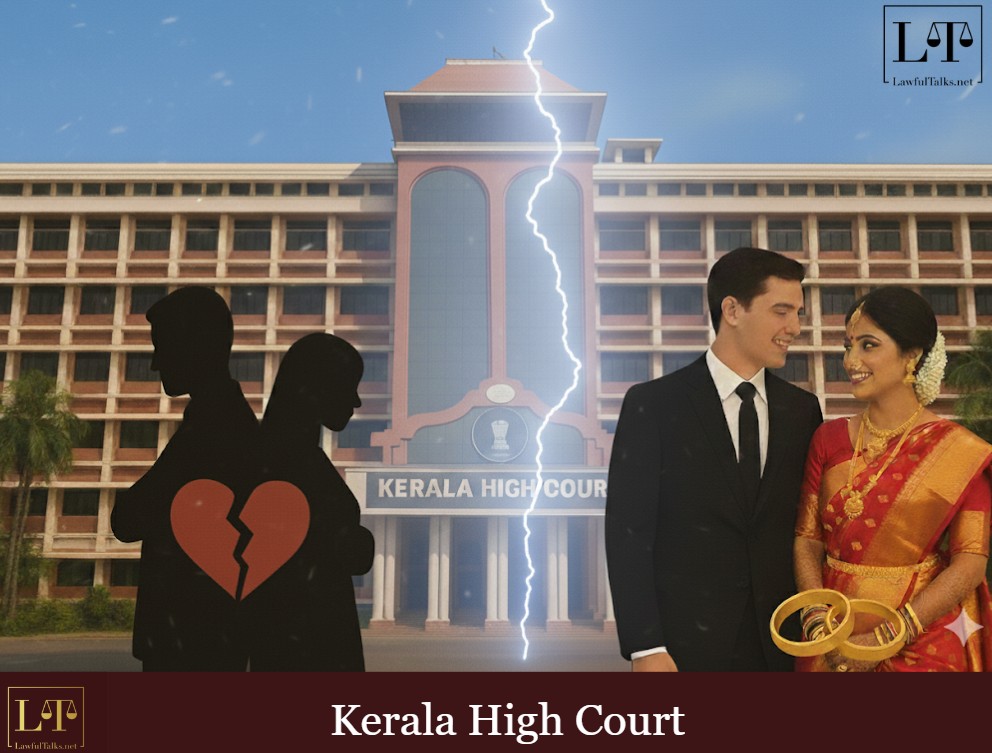Allahabad HC Sets Aside Afzal Ansari's Conviction, Allows Him to Continue as MP

The Kerala High Court has recently held that a marriage solemnised during the statutory period for filing an appeal against a decree of divorce will not be rendered invalid, provided the decree remains unchallenged by the former spouse.

The case required an interpretation of Section 15 read with Section 28 of the Hindu Marriage Act, 1955, particularly on the operative timing of a decree of divorce and the commencement of the limitation period for appeal.
Additionally, within the scope of the court’s consideration was whether a spouse could lawfully remarry on the very day a decree dissolving an earlier marriage is pronounced, and whether the Family Court was justified in permitting an amendment to a pending divorce petition to seek a declaration that the subsequent marriage was void.
The decision on this case was delivered by a division Bench of Justice Devan Ramachandran and Justice M.B. Snehalatha, while considering an original petition by the wife (petitioner) who was seeking to review the Family Court's order.
Background:
The facts mentioned in the judgment reveal that the parties to the case are husband and wife and the former, sued the latter for divorce before the learned Family Court, South Paravoor. It was the husband’s case that pending his application for divorce he ‘found out’ that his wife - who was earlier married to another – obtained judgment dissolving her first marriage only an hour or two after they were married and hence such marriage is void.
He contends that the judgment above mentioned takes effect only after the time it was delivered; and thus applied for amendment of his pleadings, to incorporate additional grounds and plea for a declaration that the marriage is void.
This was allowed by the impugned order of the learned Family Court and the petitioner-wife assailed it.
Petitioner submissions:
The petitioner’s counsel submitted that the Family Court was incorrect to permit proposed amendments concerning the declaration of the marriage to be void. The respondent had claimed that the marriage took place at 10 A.M. and that the earlier marriage decree did not dissolve the earlier marriage until after 11 A.M., but it was submitted for the petitioner that even if the decree was not effective until 11 A.M, the prior marriage would still dissolve after it was taken under deliberation for judgment and attached full force and effect from the start of the day it was rendered, regardless of a specific time.
Respondent’s submissions:
The respondent’s counsel, submitted that his client did not learn until March 2025, that the dissolution of the petitioner’s earlier marriage was on 28.12.2007. Counsel furthers this point by outlining that Family Court decrees are usually provided later in the day after 11 A.M., and, therefore because this marriage took place at 10 A.M. that same day, the alleged marriage would have been void. The respondent’s amendments were justified for alternative reliefs, stated counsel, and under Section 15 of the Hindu Marriage Act, the petitioner could not marry on the same day as the prior decree.
After the conclusive hearing of submissions ,the court observed, “On the fundamental norms, no doubt, Section 15 of the ‘Act’ would authorize a person to lawfully marry only after the time frame for appealing against the decree dissolving his/her earlier marriage has elapsed, or if an Appeal had been dismissed. This is more manifest from Section 28 of the ‘Act’; and no one can have a case against the same.”
The court clarified further that, “Every judgment, as soon as it is delivered, becomes the operative pronouncement of the Court. Order XX Rule 1 of Code of Civil Procedure (CPC) mandates that judgments and orders be delivered in Open Court. Such judgments or orders become effective as soon as they are dated and signed by the Judge/s. Pertinently, the period of limitation prescribed for preferring Appeal or Revision – as the case may be – starts running from such date and not from the time of actual delivery of the judgment… Ineluctably, therefore, once the judgment is pronounced/delivered, it takes effect immediately and operates from the commencement of the day it was so pronounced or delivered.”
The court affirmed that the Family Court ought not to have allowed the application of the 1st respondent for amendment; and resultantly allow this Original Petition.
Case Title: Rakhi v. Krishnakumar and Ors.
Appearance:
Counsel for the petitioner: Johnson Gomez, Sanjay Johnson
Counsel for the respondent: K.R. Arun Krishnan, M.S. Ajithkumar, Deepa K. Radhakrishnan, Sanal C.S., Vishak K.V.

Nikita Muddalgundi
Second Year, B.A. LL.B student
Latest Posts
Categories
- International News 19 Posts
- Supreme Court 390 Posts
- High Courts 383 Posts



















































































































































































































































































































































































































































































































































































































































































































































































































